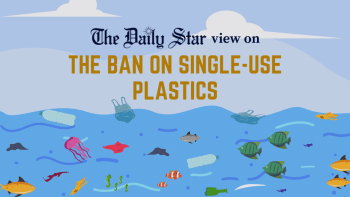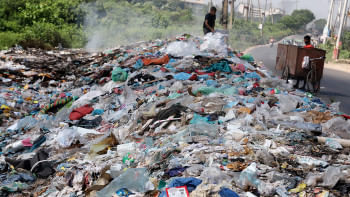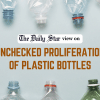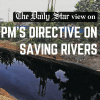We must end the menace of throwaway plastic

Bangladesh's plastic problem seems only to be growing, and growing uncontrollably fast. Over the last few years, we have had reports and images on plastic pollution almost on a daily basis. On Monday, The Daily Star also published a photograph with a tell-all caption that underscores the severity of the problem. It captures the confluence of three canals in the Mugdapara area of Dhaka which is barely recognisable amidst a sea of garbage including used plastic bottles and polythene bags dumped there by the residents. The extent of waste accumulation is quite staggering, reducing the connecting waterways – Khilgaon-Basabo canal, Jirani canal, and Manda canal – to a mere semblance of their former selves.
It is evident that these canals, which once played a vital role in supporting biodiversity and providing relief to local communities, have turned into veritable dumping grounds, their water struggling to flow through the labyrinth of plastic waste and discarded refuse. Everything about the photo strikes a chord of despair. This is not just the result of improper waste disposal but also of unmitigated plastic production and consumption, which has emerged as the biggest threat to our environment in recent years.
It is not that Bangladesh has not attempted to curb the spread of these non-biodegradable products. The country's polythene ban in 2002 was heralded as a landmark decision, and latter embargos on single-use plastics also gave hope that the plastic menace could be curbed to a satisfactory extent. There are also regulations about waste disposal, although proper infrastructure is yet to be widely available in Dhaka. In hindsight, however, lack of legal tools was never a problem for us. It is the enforcement of such laws and prohibitions that has proved to be a daunting challenge, rendering them quite meaningless. Lack of enforcement and compliance has also rendered irreversible damage to our ecosystems and the health and well-being of our people, and the photo serves as a testimony to that.
We must put an end to this trend. Several things must happen simultaneously for us to be successful: we must limit production and consumption of plastic products, recycle or treat plastic waste before it lands in our water sources, build necessary infrastructure for waste disposal, and raise public awareness about proper waste disposal. The fact is, the level that plastic pollution in the country has reached should worry everyone. The authorities, therefore, must take more stringent measures to enforce the polythene ban, while also promoting sustainable alternatives and recycling initiatives. Community involvement is also vital to foster responsible waste management practices and protect our environment and natural resources.


 For all latest news, follow The Daily Star's Google News channel.
For all latest news, follow The Daily Star's Google News channel. 










Comments